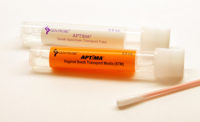Leak Tester Quickens Production of Quality Parts

In 2017, TMMI began using the F620 Primus tester, which has a cycle time of only 0.09 second. Photo courtesy ATEQ Corp.
For 50 years, progressive-die-stamping specialist Trans-Matic Manufacturing Inc. (TMMI) has stayed focused on producing affordable, high-quality parts for its thousands of customers. This approach has definitely proved to be successful—enabling TMMI to grow from a small two-machine shop in 1968, to the first deep-draw metal stamping company in western Michigan. Today, it produces a wide range of components for automotive, HVAC, plumbing, lawn equipment, lighting and power-tool companies in North and South America, and Asia.
TMMI relies on several high-speed transfer presses (5 to 600 tons in capacity) to make deep-drawn stamped metal parts up to 4.5 millimeters thick and 200 millimeters deep. The parts often have complex geometries and configurations, yet require no costly secondary processes.
Headquartered in Holland, MI, TMMI also operates production facilities in Mesa, AZ; Monterrey, Mexico; and Suzhou, China. All of the plants are TS16949 and ISO14001 certified, and produce parts made of stainless steel, low carbon steel, aluminum, copper, brass and durable plastic. Other plant activities include prototyping, advanced-product development, tool design, value-added assembly and nondestructive testing.
Since 2000, TMMI has used various ATEQ Corp. differential pressure-decay leak testers to test small-volume cylindrical parts like fuel-delivery oxygen sensors and antilock brake system components. Each tester is located near a deep-drawn stamping press, which shapes flat metal into cylinders.
Initially, TMMI used ATEQ Series 3 testers for this application, before upgrading to Series 5 F520 units several years later. In differential pressure-decay testing, the test part and a reference part are simultaneously filled with the same amount of air. Any small variation or drop in differential pressure between the parts is recorded by the tester’s transducer membrane.
For this specific application, each part was filled with 5 psi of air and total cycle time was 0.14 second. Test parts with a leak rate exceeding 30 cubic centimeters per minute were rejected.
Last year, TMMI needed to further reduce testing cycle time to keep up with production. Company representatives discussed the situation with ATEQ and decided to try its Series 6 F620 Primus testers. With a cycle time of only 0.09 second (0.01 second for fill, 0.05 second for stabilization and 0.02 second for testing), the testers helped TMMI nearly double its production to 500,000 parts per week.
The F520 tester is specially designed for fully or semiautomatic workbenches on production lines. It offers seven inputs, five outputs and multiple ranges of pressure drops (50, 500 or 5,000 pascals) and test pressures (75 mbar to 20 bar) measurement. More than 30 test programs are included and use different modes (pressure loss, flow units and blockage). Setup is easy, with the tester linking to equipment via an RS232 or RS485 serial port.
Model F620 stores 128 test programs and allows manual calibration on its front panel. The tester’s interface enables it to be plugged into a PLC or test bench without having to reprogram either.
ATEQ also makes electrical, tracer gas, continuous, mass and laminar flow testers. Nearly 100,000 standard and custom units are currently in use worldwide. For more information, call 734-838-3100 or visit www.atequsa.com.
Looking for a reprint of this article?
From high-res PDFs to custom plaques, order your copy today!





